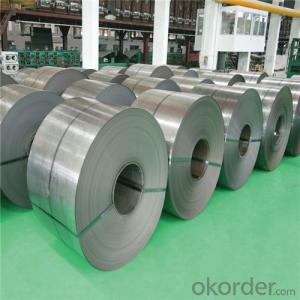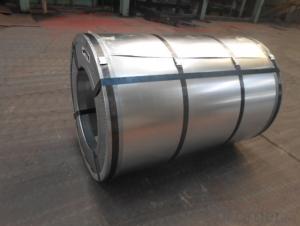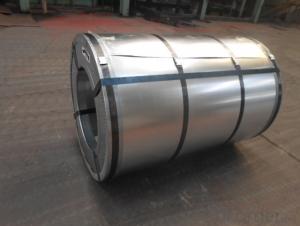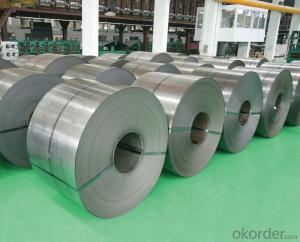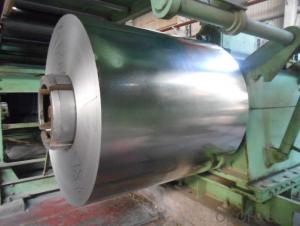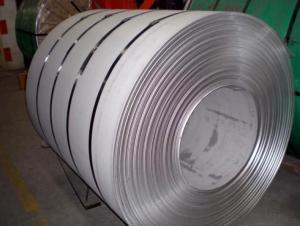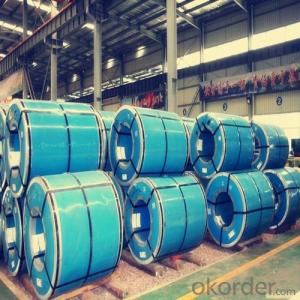Cold Rolled Steel Coil with Good Quality and Best Price
- Loading Port:
- Shanghai
- Payment Terms:
- TT OR LC
- Min Order Qty:
- 50 m.t.
- Supply Capability:
- 5000 m.t./month
OKorder Service Pledge
OKorder Financial Service
You Might Also Like
Pure Cold Rolled Steel Coil Used for Industry
1.Structure of Cold Rolled Steel Coil Description
Cold rolling means that hot rolled steel coil is rolled below recrystallization temperature after pickling, and its finished product is full hard coil. After annealing process for full hard coil, the finished product is cold rolled production. The thin gauge cold rolled steel sheet and strip steel have advantages of low surface roughness, high dimension accuracy and good mechanical properties etc, and which have been widely used in auto manufacturing, home appliance, architecture, aviation, precision instrument, hardware and enameling industry etc.
2.Main Features of the Cold Rolled Steel Coil
•High Purity
•Easy control and operation
•High strength
•Fast melting
•Competitive price
•Best Service
3. Cold Rolled Steel Coil Images
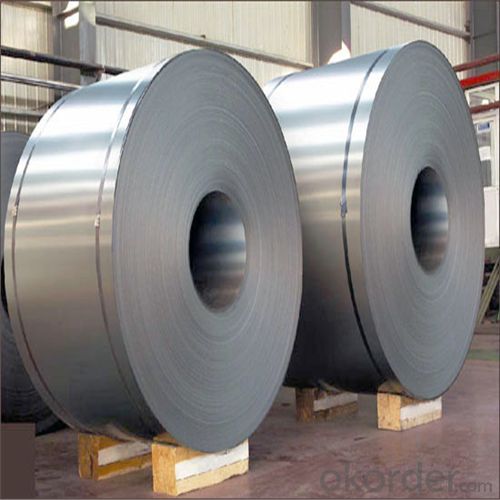
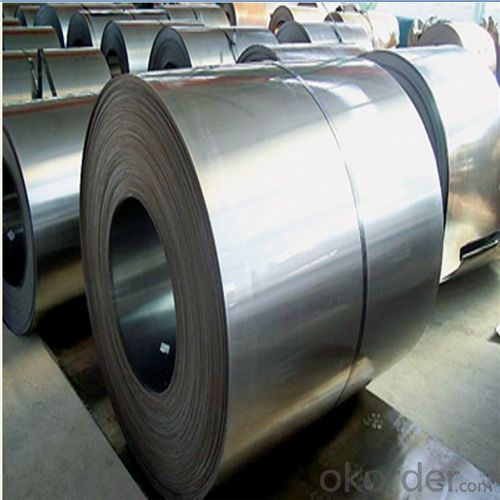
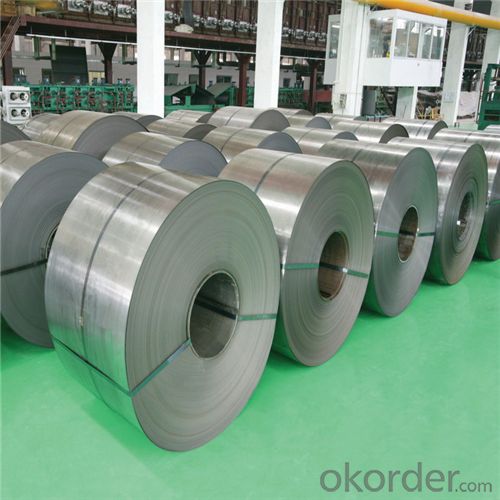
4. Cold Rolled Steel Coil Specification
COLD ROLLED STEEL COIL | |
Thicknenss | 0.10mm-4.00mm |
Width | 600mm-2000mm |
Sheets length | 1200-6000mm |
Coil inner diameter | 508-610mm |
Surface treatement | matt finish/bright finish,oiling/dry, bright anneal/black anneal |
Coil weight | 3-5t |
5.FAQ of Cold Rolled Steel Coil
We have organized several common questions for our clients,may help you sincerely:
①How about your company?
A world class manufacturer & supplier of castings forging in carbon steel and alloy steel,is one of the large-scale professional investment casting production bases in China,consisting of both casting foundry forging and machining factory. Annually more than 8000 tons Precision casting and forging parts are exported to markets in Europe,America and Japan. OEM casting and forging service available according to customer’s requirements.
②How to guarantee the quality of the products?
We have established the international advanced quality management system,every link from raw material to final product we have strict quality test;We resolutely put an end to unqualified products flowing into the market. At the same time, we will provide necessary follow-up service assurance.
③How long can we receive the product after purchase?
In the purchase of product within three working days, We will arrange the factory delivery as soon as possible. The pecific time of receiving is related to the state and position of customers.Commonly 7 to 10 working days can be served.
- Q: How are steel coils used in the production of aerospace parts?
- Due to their strength, durability, and versatility, steel coils find extensive use in the aerospace industry for the production of aerospace parts. Made from high-quality carbon steel, these coils are formed into a coil shape, facilitating their transportation and storage. In the aerospace sector, steel coils play a crucial role in manufacturing different components, including structural parts, engine parts, landing gear, and fasteners. Specifically, steel coils are extensively employed in the fabrication of aircraft frames and fuselage structures. These coils are often cut, shaped, and welded to create the necessary structural components, which contribute to the aircraft's strength and stability. Another significant application of steel coils in aerospace production is the manufacturing of engine parts. Complex shapes are formed from the processed steel coils to produce components like turbine blades, shafts, and casings. These components must withstand high temperatures, pressure, and stress, and steel coils possess the requisite strength and heat resistance for such demanding applications. Furthermore, steel coils find utility in the production of landing gear, which supports the aircraft during takeoff, landing, and ground operations. The processed steel coils are shaped into various parts of the landing gear system, including struts, beams, and brackets. These components undergo rigorous testing and require excellent strength, toughness, and fatigue resistance, all of which are provided by steel coils. Additionally, steel coils are commonly employed in the manufacturing of fasteners essential for aerospace applications. Bolts, screws, and rivets play a crucial role in joining different components together, ensuring structural integrity and safety. Steel coils are processed and formed into the desired shapes for these fasteners, offering the necessary strength and reliability for these critical connections. In summary, steel coils are indispensable in the production of aerospace parts due to their exceptional mechanical properties and reliability. Their versatility enables various shaping and processing techniques, allowing for the creation of complex and high-performance components. By incorporating steel coils into aerospace manufacturing, the industry can ensure the production of durable, safe, and efficient aircraft.
- Q: What are the main factors to consider when selecting a steel coil supplier?
- When selecting a steel coil supplier, the main factors to consider include the supplier's reputation and reliability, the quality of their products, their pricing and payment terms, their delivery options and lead times, their customer service and support, as well as their ability to meet your specific requirements and specifications.
- Q: What is galvanized steel coil?
- Galvanized steel coil is a type of steel that has been coated with a layer of zinc to protect it from corrosion. The process of galvanization involves immersing the steel coil in a bath of molten zinc, which forms a protective layer on the surface of the steel. This layer not only prevents corrosion but also provides a barrier against scratches and other damage. Galvanized steel coil is commonly used in various industries, including construction, automotive, and manufacturing, due to its durability and resistance to rust. It is often used for making roofing materials, pipes, and automotive parts, among other applications. Overall, galvanized steel coil is a versatile and cost-effective solution for ensuring the longevity and integrity of steel products.
- Q: How are steel coils inspected for thickness variations?
- Steel coils are inspected for thickness variations using non-contact laser measurement systems. These systems use laser sensors to scan the surface of the coil and measure the distance between the sensor and the coil at multiple points. The data collected is then analyzed to identify any variations in thickness, allowing for quality control and ensuring compliance with desired specifications.
- Q: What are the common packaging defects in steel coils?
- Steel coils can have various packaging defects. These include edge damage, rust or corrosion, coil slippage, coil damage during handling, inadequate protection against impacts, improper coil strapping or banding, and insufficient labeling or identification. When the edges of the steel coil are not properly protected or wrapped, it can lead to dents, scratches, or deformities. This compromises the coil's integrity and can result in reduced performance or structural issues. If steel coils are not adequately protected during packaging, they can be prone to rust or corrosion. Moisture or harsh environmental conditions can cause oxidation, resulting in rust spots or widespread corrosion. This weakens the steel and makes it less suitable for its intended use. Improper packaging can cause the coils to shift or slip within the packaging material during handling or transportation. This can lead to misalignment, deformation, or interlocking, making it difficult to separate or use the coils effectively. Rough handling, improper lifting techniques, or inadequate support can cause mechanical damage to the steel coils. This can result in dents, scratches, or more severe structural damage, impacting their functionality or performance. Steel coils need sufficient protection against impacts during transportation or storage. Insufficient padding or cushioning can lead to deformities, dents, or fractures in the coil due to impacts or collisions. If the strapping or banding used to secure the steel coils is not properly applied or tightened, it can cause coil slippage or even complete unraveling of the packaging. This creates a tangled mess of steel coils, making them difficult to handle, transport, or use. Proper labeling and identification are crucial for efficient handling, storage, and tracking of steel coils. Inadequate or incorrect labeling can cause confusion, delays, or even loss of the coils during transportation or storage. To prevent these packaging defects, it is important to follow proper guidelines, use appropriate materials, provide adequate protection, and ensure proper labeling and identification of steel coils. Regular inspections and quality checks throughout the packaging process can help identify and rectify any defects before shipping or use.
- Q: What are the common coil thickness tolerances?
- The common coil thickness tolerances can vary depending on the specific industry and application. However, in general, common coil thickness tolerances range from +/- 0.001 to +/- 0.010 inches.
- Q: How are steel coils used in the manufacturing of automotive components?
- Steel coils are used in the manufacturing of automotive components by being formed and shaped into various parts such as frames, body panels, and suspension components. These coils are typically cut, stamped, and welded to create the desired shapes and sizes needed for the automotive industry.
- Q: What is the shelf life of steel coils?
- Various factors, such as the type of steel, its specific application, and the storage conditions, can affect the shelf life of steel coils. Generally, steel coils have a lengthy shelf life due to their durability and resistance to corrosion. When stored correctly in a dry and controlled environment, steel coils can maintain their quality for many years. It is important to consider that certain types of steel, like galvanized steel, may have a shorter shelf life if the protective coating is compromised and corrosion occurs. Additionally, exposure to extreme weather conditions, high humidity, or chemicals can reduce the shelf life of steel coils. To ensure the longevity of steel coils, it is advisable to store them in a covered area to protect them from moisture and direct sunlight. Proper stacking and handling techniques should also be employed to prevent any damage that could lead to premature deterioration. In conclusion, the shelf life of steel coils can vary, but with appropriate storage and handling, they can remain in good condition for an extended period. This makes them a reliable and long-lasting material for various applications.
- Q: Why is it usually scorned by the shooting community to use steel cased ammo (like Wolf)? Always hear corrosive and steel is bad for the extractor/firing pin. Hulp a simpleton out!
- if you were going to shoot thousands upon thousands of steel cases in your rifle, it would cause more wear than brass cases do. but for the casual shooter, it won't be a significant factor. Corrosive ammo is another story (but not all steel cased ammo is corrosive, and any made after 1975 is not corrosive). shooting corrosive ammo in a bolt gun is simple to care for. When finished shooting, simply clean out the barrel, chamber and bolt face etc with hot soapy water, or military bore cleaner. This nuetralizes the corrosive chemicals. then dry it well, and then do your normal clean and lube with break free CLP or whatever other lube you prefer. But for a semi auto, gas operated firearm, the cleaning process takes hours, with having to tear it down and clean every part including gas tube etc. As for the ectractor, same answer as above, since an extractor slides in front of the rim as the cartridge is fed, it really does not add much more wear if it is steel. The firing pin does not contact the steel case, only the primer, so no additional wear there. The biggest problem with wolf ammo is encountered when you fire a lot of rounds quickly, building up a lot of heat, which can cause the lacquer sealent on the case to turn gummy and this in turn will cause problems for the firearm. Answer? first, use wolf ammo for casual shooting and clean the firearm extensively afterwords. Save your better ammo for real life situations. I understand that some of the newer wolf ammo does not use the same lacquer sealant. I believe it is called silver bear, but don't quote me becasue I can't swear that that is it. shoot safe
- Q: What are the different methods of coil slitting for precision cuts?
- Coil slitting, a process utilized for cutting large coils of material into narrower strips, is achieved through various methods that offer distinct advantages and suitability for different applications. 1. Rotary Shear Slitting, the most commonly used method, employs rotating circular knives to shear the material and create multiple strips. The distance between the blades can be adjusted to achieve the desired width. This method guarantees high precision with smooth and burr-free edges. 2. Drag Knife Slitting involves the use of a knife with a drag or tangential orientation that follows the material's contour and produces accurate cuts. It is ideal for materials with irregular shapes and finds application in the textile industry to cut fabrics. 3. Scissor Slitting utilizes two blades that move in a scissor-like motion to cut the coil. This method is commonly employed for thinner materials, providing excellent control and precision. It is ideal for materials prone to deformation or wrinkling. 4. Razor Slitting involves the use of a single or multiple razor blades positioned perpendicular to the material. It is particularly effective for cutting stretchy or delicate materials, minimizing the risk of tearing or deforming. 5. Crush Cutting applies pressure from a hardened steel roller or an anvil against a softer material, causing it to deform and split along the desired cutting line. It is suitable for materials that are challenging to cut with sharp blades, delivering precise and clean cuts. In conclusion, the choice of coil slitting method depends on the material, desired precision, and specific application requirements. Each method offers unique benefits and can be tailored to meet specific cutting needs, ensuring accurate and efficient coil slitting processes.
Send your message to us
Cold Rolled Steel Coil with Good Quality and Best Price
- Loading Port:
- Shanghai
- Payment Terms:
- TT OR LC
- Min Order Qty:
- 50 m.t.
- Supply Capability:
- 5000 m.t./month
OKorder Service Pledge
OKorder Financial Service
Similar products
Hot products
Hot Searches
Related keywords
